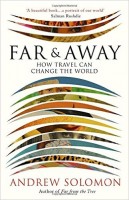Far & Away: How Travel Can Change the World
by Andrew Solomon
(Chatto & Windus, £25)
 I was reading the introduction to this book while Theresa May was telling the Tory Party conference: “If you believe you’re a citizen of the world, you’re a citizen of nowhere.” Andrew Solomon would argue otherwise. He holds both American and British passports. He is a firm believer that it’s not only possible to be a citizen of the world but essential, and that travel, which forms the well-rounded citizen, should be encouraged as energetically as attendance at school, environmental conservation and national thriftiness. Especially now.
I was reading the introduction to this book while Theresa May was telling the Tory Party conference: “If you believe you’re a citizen of the world, you’re a citizen of nowhere.” Andrew Solomon would argue otherwise. He holds both American and British passports. He is a firm believer that it’s not only possible to be a citizen of the world but essential, and that travel, which forms the well-rounded citizen, should be encouraged as energetically as attendance at school, environmental conservation and national thriftiness. Especially now.
“Travel,” he writes in his introduction, “is not merely a pleasant diversion for the well-to-do, but the necessary remedy to our perilously frightened times. At a moment when many politicians are stoking anxiety, telling people that it’s too perilous even to leave the house, there is new urgency to the arguments for going out and recognising that we are all in the game together. The quest for freedom and adventure reflects the imperative of internationalism in these paranoiac times.”
Solomon, a regular contributor to The Guardian as well as to The New Yorker and The New York Times, got the urge early, thanks to a mother who loved to travel and a father who told him that Jews (and their family was Jewish) had been slaughtered during the Holocaust because “They had nowhere to go.” Solomon Junior decided then that that would never happen to him: “I would always have friends who were different from me, the kind who could take me in or get me out.”
Far & Away is a collection of essays written over a quarter of a century on magazine assignments that have taken Solomon to 83 of the world’s 196 recognised countries. It’s organised chronologically and, as his earliest commissions were to write about art, opens with 200 pages in which, successively, Russia, China, South Africa and Taiwan are seen largely through the eyes of artists. Though these pieces are illuminating about the countries beyond the studio and the gallery, they are hardly a reflection of the writer’s broad interests and boundless curiosity. More representative are the next 300 pages, where he tackles subjects as various as depression in Greenland, policing in Rio’s favelas and the first faltering steps towards freedom in Myanmar (Burma).
There are a few pieces (one on an indolent motor-yacht cruise round Turkey, one on a safari in Zambia) that are more tourism than travel, but generally this is a fine collection from a gifted writer and a wise and empathetic traveller.
Best of all, perhaps, is that 45-page introduction, which he rewrote in response to the result of the United Kingdom’s referendum on membership of the European Union. (He changed his subtitle, too: on the proof I was sent in August, it was “Reporting from the Brink of Change: Seven Continents, Twenty-Five Years.” On the finished book, which I received in October, it’s the crisper, more pointed “How Travel Can Change the World.”)
In that introduction, Solomon argues powerfully against circling the wagons, and for engagement and reciprocity: “You can’t fit in with people by pretending to be just like they are; you fit in by engaging in a dialogue about your differences, and by putting aside the assumption that your way of life is in any way preferable to theirs.” MK

Leave a Reply